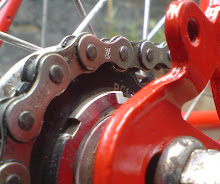There is a basic premise of superhero fiction, that the actions of an extraordinary individual (or group) can make all the difference between disaster and the safety of millions, if not all of humankind. It’s a premise I’m willing to accept for the sake of entertainment (I’m probably one of the sizeable minority eagerly waiting for Hellboy II).
The premise is flawed in a couple of ways when compared to reality, however. First, humans come equipped and/or develop a spectrum of abilities, but it’s a limited spectrum, with Olympians and geniuses at the upper limits. We know what they can do and, extraordinary though they might be, we know they cannot fly, leap tall buildings or move objects with the power of their minds. Second, and partly as a consequence of the first flaw, individuals can only have a limited effect on the course of human history.
There have been some disproportionately effective individuals, but their effect is more often as a catalyst for social forces that would find form with or without them, later if not as soon they made it so. The ironic example is Karl Marx, who pushed the cause of proletarian empowerment with Herculean forcefulness. The Twentieth Century is often portrayed as entirely coloured by the ink from his pen. Yet Marx himself recognised that revolution is a consequence of the social environment more than a conscious decision of the people. In other words, socialist-communist thinking would have evolved and manifested itself if Marx had never been heard.
It is difficult to argue that the world would be the same today without the actions of Adolf Hitler, but over centuries, I believe we would reach the same stage of development. Having said that, the rise of the Nazi Party was as much the consequence of the circumstances in Germany between the wars: economic depression, extreme national pride shamed by failure in the “Great War” and the disproportionate suffering of the poor Germans. So another catalyst might well have led Germany to the same awful state.
If all I’ve said here means anything, is there any point in having real-life heroes? Well, yes.
Because ecopolitics has an element of fatalism, which it shares with Marx, that doesn’t mean that it is without hope. Which brings me to my first hero: Per Gahrton. When I met Per, it was near the end of his long career in electoral politics. He had been a member of the Swedish Parliament for the People’s Party and left to co-found the Swedish Green Party. I don’t know why he did it, but he was one of the few “eurosceptic” voices in the European Parliament.
I’m not sure how effective he was in fighting “ever deeper union” from within, but I suspect he found it depressingly futile. He published a small booklet on his views of Green politics and it included an indictment of those who took Sweden into the EU, with their promises of Swedish independence on issues of economics and [stricter] environmental protection. Both were eroded almost immediately after Sweden joined.
At the end of the booklet, having exposed the erosion of all the Green principles he believes in, Per asked himself if this meant that he could still be optimistic. “I am not optimistic,” he said, “but I have hope.”
It’s a quote that makes me teary-eyed because I believe in the same principles and share the sentiment.
Next season: more heroes.


No comments:
Post a Comment